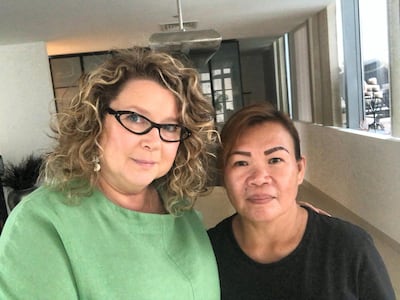Isabella Sanna-Martin works hard as an HR manager, but because she and her husband can afford the luxury of a full-time maid, they do not worry about the housework when they get home.
"The benefit for our family of having a live-in helper is that instead of me doing the housework, l can focus on raising our two children while working full-time, and enjoy down time with my family on the weekends," says Ms Sanna-Martin, an Australian-Italian, who lives in Abu Dhabi.
Her maid for the last four years, Nieves Butacan, is now moving to the United States to be with her husband, meaning Ms Sanna-Martin is looking for a new domestic help.
This can be a costly procedure, with sponsorship costs starting from Dh5,000 to Dh 6,000, according to Angelica Robinson, founder of the professional nanny placement and training company CloudNine Kids. “Plus a deposit may also be required costing Dh2,000 plus, depending on the nationality,” she says.
The hiring process for domestic helpers has recently been streamlined and regulated by the introduction of Tadbeer Centres, which aim to guarantee proper visa, orientation and training for workers. Eleven Tadbeer centres opened in May, with another 14 scheduled to open by the end of the year.
These centres offer services related to employing domestic helpers, including issuing, renewing and cancelling employment contracts and work permits.
There are four packages: the first relates to recruiting domestic workers from outside the country with the fee – dependent on the nationality of the worker – ranging from Dh14,000 for Filipino workers to Dh2,000 for Indian workers, excluding the cost for entry visas, accommodation and medical check-ups. While other private recruitment companies still operate in the UAE, in the future all overseas recruitment will be carried out through Tadbeer centres.
A second package focuses on temporary hiring, with helpers paid a monthly salary of between Dh2,250 to Dh2,500, while a third package, which restricts hiring to a two-year period, also stipulates a monthly wage of between Dh2,250 and Dh2,500.
For those that prefer flexibility, the temporary package enables domestic employers to be hired hourly, daily, or weekly – an option that helps to address the illegal practice of hiring part-time maids who are the most vulnerable to abuse.
Some UAE residents reveal to The National how much they pay to hire their domestic help.
__________
Read more:
UAE nannies earn an average Dh1,830 per month, study says
The rise of an app that helps UAE nannies save, invest and borrow
MaidMe: the app that lets you rate your maid
How to pick the right health insurance for your dependants in the UAE
__________
Option one: full time help
Those looking for full-time support can either turn to a recruitment agency or search locally via recommendations or a Facebook group. “Many families are avoiding the cost of flying in a new nanny from overseas,” Ms Robinson explains.
Canan Anli, a Turkish business professional who lives in Abu Dhabi, is looking for a new live-in nanny who is already based in the UAE. “My nanny is up at 6am preparing the kids breakfast and lunch boxes while I take my shower and get ready myself, and it is not realistic to go for a live-out with such an early start,” she says. “The starting salary I’m offering is Dh2,500, but we could offer more for the right candidate.”
While a 2017 survey by Rise of adverts on their Facebook nanny-hiring group Mary Poppins, found the average nanny salary was Dh1,800 a month, costs vary wildly, and Ms Robinson believes that a live-in helper with a UAE driver's licence or a qualification (for example, teaching or midwifery) can expect to earn around Dh3,500. This rises to Dh4,500 for a helper living outside.
Rise co-founder Milind Singh says there is more willingness to pay a higher rate for better-skilled nannies. "We're seeing more specific demands for child safety and teaching assistant skills," he says.

Gina Dillon, an American who runs the Facebook group UAE Housemaids, identifies the same trend, and believes it is leading to an increase in wages. "Many sponsors who value the skillsets are willing to pay extra for these experienced ladies," she says.
“Inviting someone into your life is a big step and many want to make sure that the helpers they hire are right for their families, and for that they are willing to pay more. There is a shift in mindset from hiring cheap to hiring quality.”
For those willing to pay
for training, a two-day programme for nannies of children from zero to six years with CloudNine Kids costs Dh2,000 plus VAT.
Healthcare insurance is another cost to factor in; sponsors can expect to pay between Dh550 and Dh3,000 per year, depending on the type of cover, salary and age of the domestic helper.
Opting for the cheapest insurance can lead to expensive medical bills further down the line, and Ms Dillon says sponsors should consider how to address unexpected health emergencies from the outset. “I have received questions in my group regarding situations from major dental treatment to cancer,” she says.
It is normally expected for sponsors to also provide a monthly food and toiletry allowance, a mobile phone with a contract or credit and return flights home for their domestic help.
One issue many employers struggle with is how and when to give salary increments.
Ms Robinson says a salary rise or bonus should not be expected nor demanded by an employee, but should be implemented upon job performance.
"If you are happy with the overall work of your nanny, then ideally at the end of each year of employment, you can consider a salary increment of 5 to 15 per cent of their current salary or a bonus at your discretion," she advises. "The most important thing is to let your nanny know from the beginning about these incentives so she is motivated to work towards a goal."
Ms Anli says she tends to give yearly rises. “The starting salary I’m offering is Dh2,500, but our current nanny is getting Dh3200,” she says.
Another hot topic, says Ms Dillon, is gratuity pay. “Every housemaid hopes to receive a gratuity as it is extended to almost every other worker in the UAE,” she says.
“Unfortunately, not every sponsor is able to give it. Many expats need to leave the country sooner than expected due to work situations, and therefore do not have the funds for gratuity payments. It is unfortunate but common during the last few years.”
__________
Read more:
UAE's new recruitment fees 'to offer domestic workers more protection'
New UAE labour insurance policy protects expat workers from job loss
UAE in push to tackle exploitation in recruitment, at home and abroad
Now Money: a fintech start-up servicing the UAE's low-income migrant population
__________
Option 2: part-time help
A cheaper alternative to full-time sponsorship is to hire someone part time, who is sponsored by an agency.
Families can hire a cleaner from one of the new Tadbeer Centres at a rate of Dh120 a day for four hours, or Dh200 for eight hours.
Mr Singh says part-time hiring is growing in popularity in the UAE, but it’s not a trend he’s very keen on when it comes to caring for children. “Given that 94 per cent of kids in the UAE are under nanny supervision, our view is families should focus on getting the best quality childcare for their kids and it is much easier to do so when the maid is on your visa. he says.
“You have the ability to train her, travel with her on your holidays and most importantly allow the child to build a bond of trust with one person, rather than a revolving door of replacements.”
Louise Attavar, 45, a housewife from Mumbai, says her family “manages perfectly” with their part-time helper, Sunita, provided by the agency SMS Maids. “Since my son is now 18, we didn’t really need anyone full time,” explains Mrs Attavar, who lives in MBZ City. “I did have a full-time maid in the past, but after she left I decided on part-time help instead because privacy is important to me.”
The Attavars pay Dh40 an hour for Sunita to come six hours a week (totalling Dh1,000 a month), and because she is sponsored by an agency, they don't fork out for extras such as food, visa and medical insurance, making it substantially cheaper than employing a full time help.
When she was growing up in India, Mrs Attavar's parents always relied on the help of maids, as her mother worked for the US Government in Mumbai and her father was an airline manager.
"Having help is a blessing as you come home to a clean house and cooked food - or at least all the prep is already done," she says. "These days, after I entertain everything has to be done myself, including the aftermath of washing and clearing up, which can be quite tiring at times."
Not having a full-time help also means the couple pay pet sitting charges for their two cats when they go on holiday.
Option 3: serviced accommodation
John Barry has domestic helpers who visit his home every day to clean, make his beds and change his towels. The price he pays for this housekeeping service is included in his rent, because Mr Barry’s Dh120,000-a-year two-bedroom apartment at the Grand Millennium Al Wahda Hotel is fully serviced. “I still do my own dishes, wash clothes and iron the basics - the rest gets sent out for pressing to a local company,” says Mr Barry, from the UK. “I like the fact I get true five-star hotel facilities with the flexibility not to have to use them. I'm now a platinum guest in most hotel chains, and I've got enough loyalty points to treat my family to some pretty cool holidays for zero hotel cost.”
Serviced apartments are generally the domain of business travellers, relocating families and short-term residents. However, a 2017 GCP-Reidin report said there are approximately 15,000 freehold completed serviced apartments in Dubai, with 30,000 units expected to enter the market over the next five years.
Mr Barry has lived in serviced apartments in Abu Dhabi for the last two years. “I got bored of making a rental property a home with all the expense that comes with that, only for the landlord to sell and for us to have to move out, as happened three times,” he explains. “I decided that if it was to be a temporary home, then I will treat it as such.”






